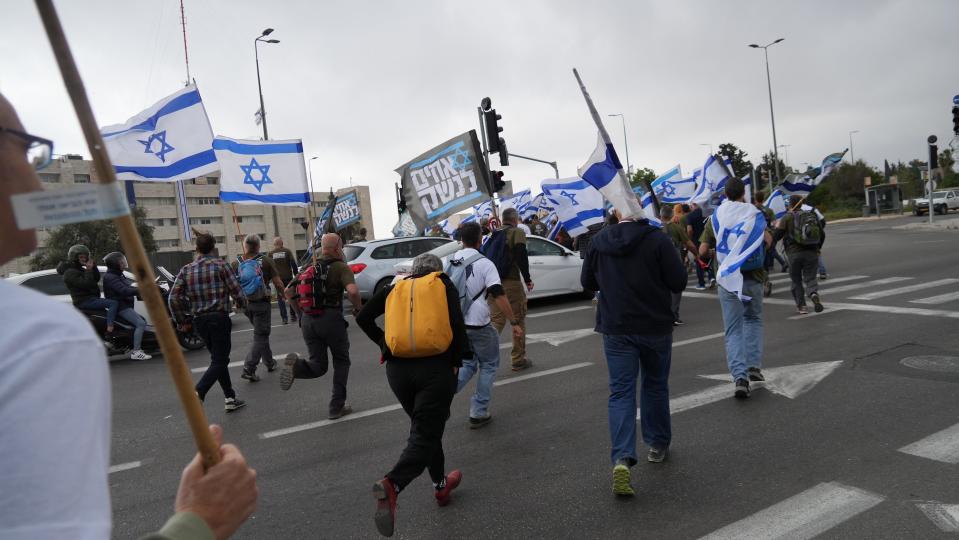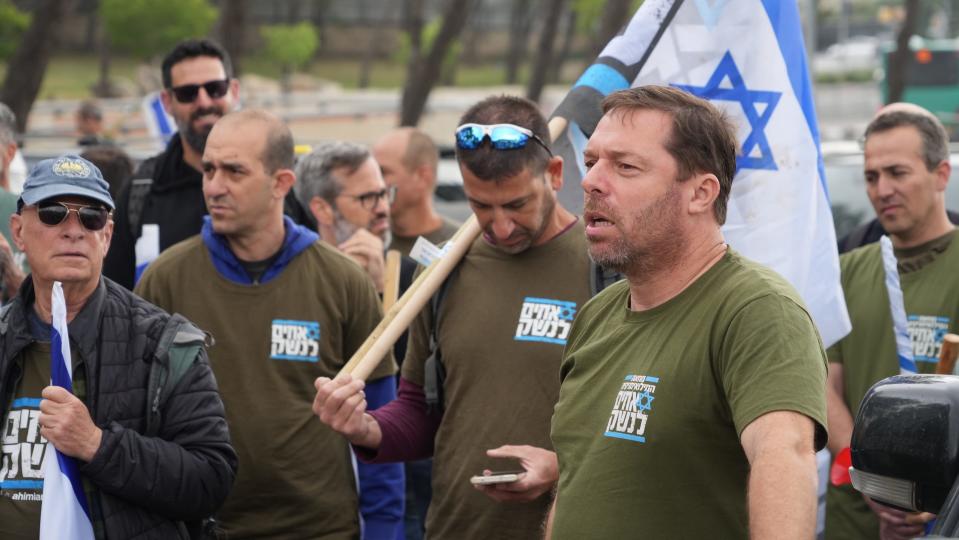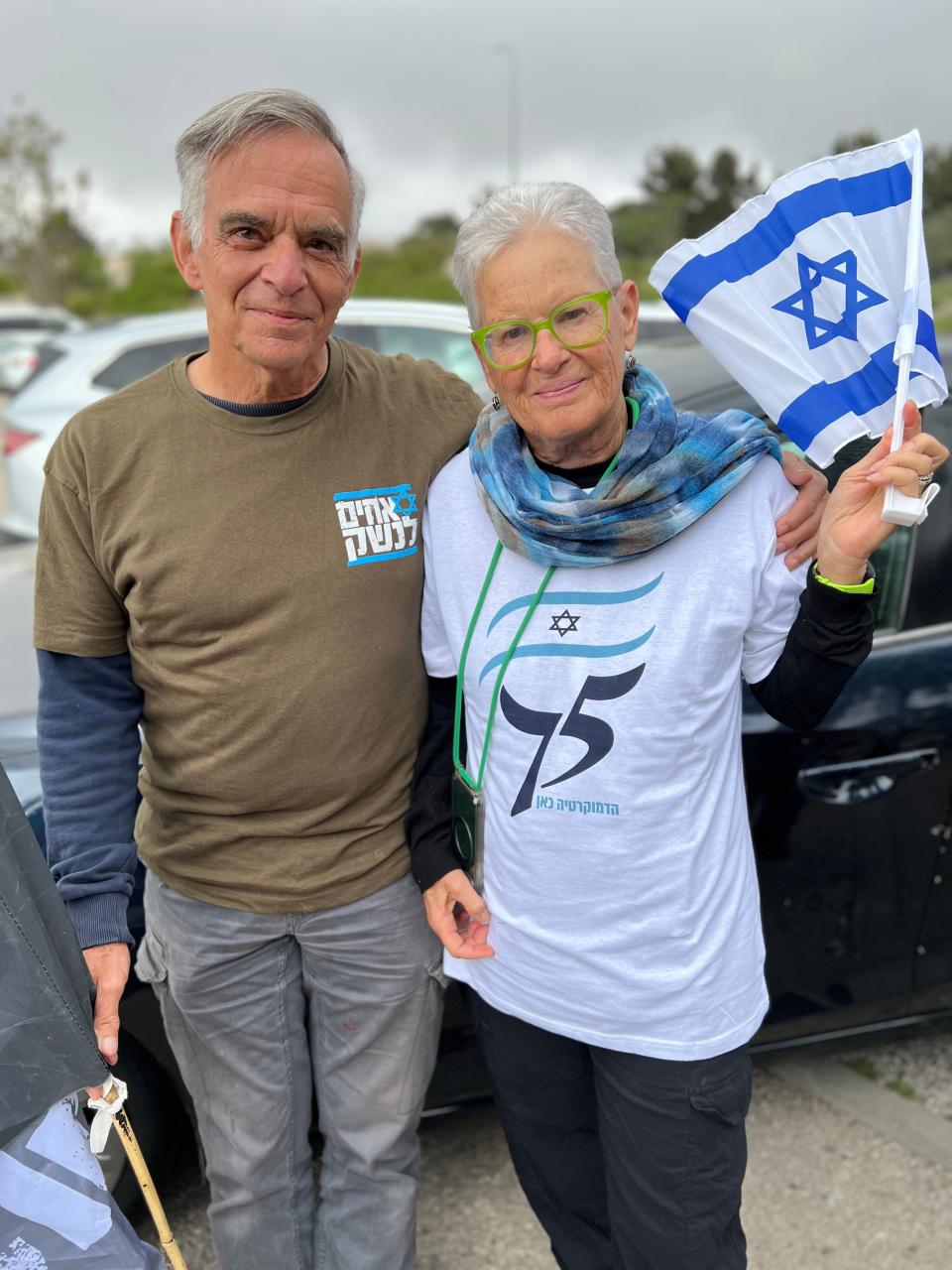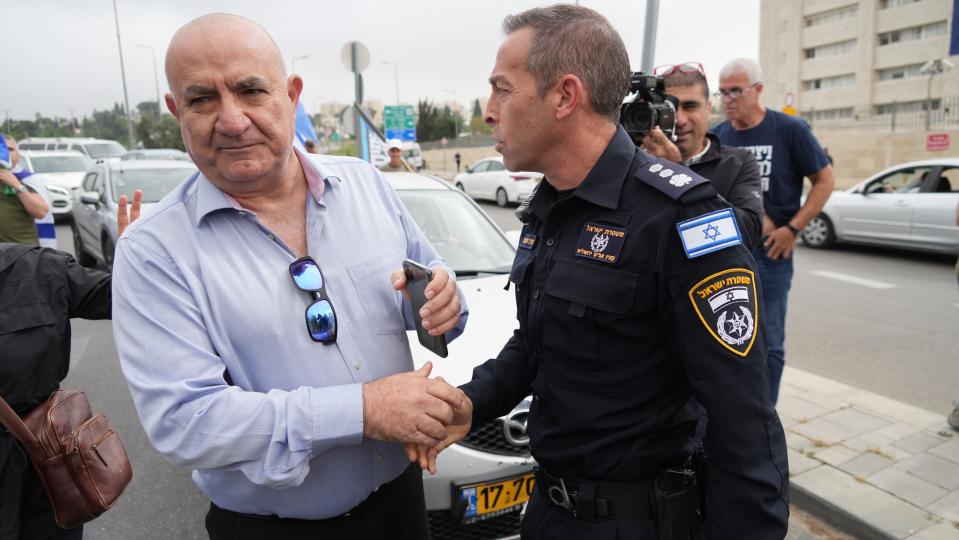Israel's military reservists have transformed a political crisis into a security one
JERUSALEM, Israel – They met at dawn. More like mid-morning, actually. Once everyone had dropped their kids off at school and had a few cups of coffee. But it was still a special operation that required careful planning. Not without risk.
Collectively, they had hundreds of years of experience in Israel's vaunted military, security and intelligence services. And this new mission was different: protest their own.
Attempts by Prime Minister Benjamin Netanyahu's right-wing government to get lawmakers to approve controversial overhauls to Israel's judiciary have led to large-scale demonstrations across Tel Aviv and other Israeli cities for weeks. It has sparked concern among allies like the United States, and threatened the running of Israel's economy.

But more than the size, intensity or duration of the protests, according to current and former Israeli officials and members of its military and security establishment, it's the growing backlash from military reservists that has given Netanyahu pause.
Those reservists include Eyal Naveh, a veteran of Sayeret Matkal, Israel’s most distinguished special forces unit.
On their nation's 75th anniversary: Israelis ask: Is this still a democracy?
'You're a smart country': Ron DeSantis say U.S. should not 'butt into' Israel affairs
On a recent day in Jerusalem, Naveh, who is 47 and carries a slight paunch in his belly, stood in the middle of a parking lot, one hand clutching a microphone, the other rested on a dark-colored Toyota Land Cruiser, and spoke to his like-minded military tribe.
They were elite soldiers, paratroopers, pilots, intelligence officers, naval commandoes, combat medics, cyber experts – an ensemble cast of some of Israel's best trained and most secretive fighting units. Military reservists with deep experience in logistics, engineering, extraction, recovery, reconnaissance.
But perhaps not, until recently, in protest.

'Not entirely natural for me'
"Once we get the cue, we're going to go over there and make it harder for them to disassemble what they have built," Naveh told the crowd, most of whom were either draped in an Israeli flag or had one at the ready to unfurl at a moment's notice.
The plan was to try to disrupt a speech that was being given across the road at Israel's National Police headquarters by National Security Minister Itamar Ben-Gvir, the leader of Israel's far-right Jewish Power party. Ben-Gvir is a divisive figure who has called for all of Israel's Arab citizens to be deported – and who has been convicted for incitement to racism. He has threatened to quit Netanyahu's ruling coalition if the reforms are scrapped – a scenario that could lead Israel down another path: its sixth election since 2019.
Israel settlements: Donald Trump proves he's the 'King of Israel'
House Speaker Kevin McCarthy: Speaks to Knesset, the Israeli legislature, about 'special relationship'
Ben-Gvir has helped push reforms that would give ultra-nationalist and religious parties in Israel's governing coalition a far greater say over rulings by Israel's Supreme Court. Netanyahu has used a month-long recess for Israel's Knesset, which started up again this week, to try to calm tensions – to allow for negotiation with opposition parties.
In the coming days and weeks, Israel will find out to what degree cool heads will prevail.
"We can't have a country where the government would also control the Supreme Court," said Gal Cohen, 50, who served in Israel's navy, on submarines, before becoming an engineer in the private sector. He is now the CEO of a pharmaceuticals start-up.
He was listening to Naveh's briefing. It was Cohen's first time demonstrating.
"This is not entirely natural for me," said Cohen. "But, you know, many Israelis like me who are usually sitting at home, taking care of our families, going for a walk, advancing our careers, paying our taxes – we couldn't take it anymore. It was too much," he said, referring to the depth of anger felt by many reservists at Netanyahu's planned reforms.
A Supreme case: How a couple's wedding cake got caught up in Israeli judicial reform
And at Ben-Gvir in particular, who many Israelis don't feel is fit to lead a security agency given his Jewish supremacist roots and his long record of anti-Arab rhetoric, including encouraging police to fire on Palestinian protesters. Ben-Gvir is a disciple of Meir Kahane, an an American-born, Israeli Orthodox rabbi whose Kach party was once named a terrorist group by the U.S. Kahane was assassinated in New York in 1990.
When a box of T-shirts – fatigue-green with a small blue Star of David printed to one side – materialized for the protesters to wear, Cohen quickly grabbed one. Standing next to him, married couple Yair and Ada Amit, 74 and 72, respectively, hadn't served for decades but they showed up because they were "worried about our democracy."

Way back, Yair Amit had served in the same special forces unit as Netanyahu, he said. He described Israel's leader as "brave," a "good guy back then. Now he's changed."
Israel's whole military system 'would collapse from within'
Israel's military relies heavily on reservists like Naveh and Cohen to train younger military personnel and to generally keep the country combat-ready in a neighborhood where it faces many security threats outside and inside its borders. On Tuesday, Israeli jets struck targets across the Palestinian-controlled Gaza Strip as armed groups there fired rocket barrages toward Israel after the hunger-strike death of Khader Adnan, a senior figure in the Islamic Jihad paramilitary group who was in Israeli custody.
The military has long been viewed as an apolitical institution that has helped unite Israel's divided society.
It may not be a coincidence that Netanyahu fired his defense minister, Yoav Gallant, a day after the former army general urged his boss to halt the reforms because it was harming the country's military. Only for Gallant to be reinstated in the job a few weeks later – after Israel's leader announced that he would be pausing the reforms.
"We're working very hard to keep these two issues – politics and the military – separate," said one senior Israeli military official, not willing to be identified because of the sensitivity of the issue and ongoing attempts to find a solution to the crisis.
"It would only take 300 or 400 people in key military roles to refuse their orders and the whole system would collapse from within," said another, insisting on anonymity for the same reason, a reserve officer who works in cyber-intelligence. "I'm not talking about officers only. I'm talking about those people who know how to use the military's tools. That's the key point here: A few hundred people can say we are not participating in this game and it is over for our military. I think Netanyahu understands this."
Still, about an hour after Cohen donned his T-shirt the only thing most people standing on a crowded sidewalk opposite the National Police headquarters could really understand was the noise. As Ben-Gvir spoke from inside the police compound, Naveh, who is the leader of a military protest group called Brothers in Arms, sought to impose some kind of order on the 200 or so reservists, mostly men but a few women, too, who were chanting "shame, shame, shame" in his direction on the other side of a high wall.
Car horns blared. Some blew whistles or beat drums. A small group of former commandoes – graying at the temples, nicely settling into their dad bods – broke off to a small patch of grass nearby, where they swiftly constructed a large wooden sign on which Ben-Gvir's head and torso were shown being enveloped by an enormous pair of lace-up boots. "You are not big enough to fill these shoes," was painted across it.

Then Moshe Karadi, a former Israeli police commissioner, showed up.
Everyone seemed to know him, and cheered his arrival.
"We're here to say to Ben-Gvir, 'Go home, this is not a job for you,' Karadi, 63, said, in between being swarmed by well-wishers among the protesters, as well as making polite conversation with a motley crew of guards, police and soldiers who were protecting the National Police headquarters from the other side of the road.
Before long, Naveh grabbed his microphone and led the group in a song made famous in Israel in the 1980s by the singer Gali Atari, though its lyrics were written by the poet Ehud Manor. "I have no other country" is also known to former U.S. House Speaker Nancy Pelosi, who quoted it during a speech to the U.S. Congress when she urged Republicans to support the impeachment of former President Donald Trump.
"I have no other country, even if my land is aflame," it starts.
"I will not stay silent because my country changed her face."
This article originally appeared on USA TODAY: Protests by Israel's military reservists worry Benjamin Netanyahu
